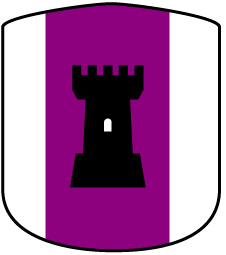Palace Guard
"I swear by Yaltur, Hikis and the Inheritor Gods that I will protect the throne and the officially elected Emperor who sits up on it. I will do so even if it takes my life or my body. I give my service to the Guard, to my Watch, and to my Officers, for now, until my life's ending. May the Guard bear witness."Tasked with guarding the Imperial Palace in Belyos, and ensuring the safety of the Emperor of Belyos at all times, the Palace Guard are fanatically loyal to the position (but not its holder) and extremely well trained. Officially they only ever leave the grounds of the Palace to accompany the Emperor, but their secret intelligence gathering organisation operates throughout the Empire, seeking out threats to their charge.
Composition
Manpower
In the Imperial Palace itself, there are said to be around two thousand guards of varying ranks, but officially the number has not been declared. The number of operatives at work around the Empire itself is unknown, probably even to those who collate and organise the intelligence received, and there are even more who are paid for their work, but are not formally classed as part of the organisation.
Equipment
Unlike the laminar amour that most soldiers wear, the Palace Guard are given plate armour made, in part, from rare meteoric iron called Godstone, forged from a deposit discovered on the island of the Imperial Province and reserved only for the equipment of the Palace Guard. It is said to be far superior to the iron smelted using current technologies, and its exotic origins lends an air of mystery and specialness to an already esteemed unit.
Weaponry
The most visible part of a Palace Guard's weaponry is the tall hooked spear, developed during Til-Yaltur's foray into Sakamohr and found to be highly effective against the cavalry used there. Whilst other units across the Empire use similar weapons, it has become somewhat of a symbol of the Palace Guard. They also carry a large rectangular shield, which is designed to be placed on the ground to act as protection against missiles, and the short sword common across the Empire.
Structure
The leader of the Palace Guard is known as the High Commander, and has the right to be seated near the Emperor wherever they may be. This gives the position immeasurable power, as the Emperor can call upon such an experienced individual for advice at any time, something not possible for other positions.
Under the High Commander are the Watch Officers, responsible for each of the six Watches of the Guard. Each Watch is on duty for ten hours, and is responsible for guarding for five hours in the middle of that duty, with a half hour overlap between each change of the guard.
A Watch is further split into assigned locations, commanded by a Sergeant, and consisting of a variable number of Guards, depending on the size and importance of the location. Guards within a Watch are cycled around locations regularly, and are expected to know the geography of the Palace intimately.
Training
Taken on very young, the first few years of a new recruit's life are taken up with educating them in their letters and numbers, and instilling in them an almost fanatical loyalty to the position of the Emperor (and not the Emperor themselves). Once they are old enough to begin physical training, they are taught how to not only wield the weapons they will be assigned with, but a whole range of weapons that they might need in a given situation, from bows to siege weapons.
At this stage, those who show appropriate skills are siphoned off into training to become an operative, and trained separately from the other recruits, to avoid a bond building up between the two types of Guard.
Palace Guards are formally assigned their Watch and take on their duties at the age of 17, but continue to train regularly. The Palace grounds are large enough that even mock battles can be fought, often a favourite spectacle of the Emperor's children, should they have any. Unless assigned to protect the Emperor's physical presence, Guards never meet them, and are never introduced. Only the High Commander and his potential successor is introduced by name to the Emperor. Guards are loyal to the throne, not the person.
Logistics
Upkeep
The costs of the Palace Guard are paid for directly by the Emperor, and funded, like all other Imperial institutions, by taxes on the various Elector Houses.
Members of the Emperors household, who lose their place in the Imperial Palace upon the death of an Emperor, are expected to move to the island of Belyos, and the estates provided there for them. Palace Guards have the right to request to move with them, and offer guard duties, but this is funded from the holdings on Belyos Island, and not draw from the coffers received though taxation.
Members of the Emperors household, who lose their place in the Imperial Palace upon the death of an Emperor, are expected to move to the island of Belyos, and the estates provided there for them. Palace Guards have the right to request to move with them, and offer guard duties, but this is funded from the holdings on Belyos Island, and not draw from the coffers received though taxation.
Recruitment
The Palace Guard is unique in its recruitment as it takes young children directly from the city of Belyos and is indiscriminate regarding class or social standing. The only requirement being that a child must be under the age of three, and have been born within the city, to parents who were also born in the city. Being taken on by the Palace Guard is a great honour for any family, although the child is never told of their heritage, and is treated equally, regardless of origin. Poor families seeking to offer up a child who might starve otherwise, middle-class artisans without a valid outlet for a second child, or noble third and fourth-born with no chance of a worthy inheritance are all considered and taken on.
History
The Emperors of the Empire prior to the Sakamohr invasion had their own guards, often recruited from the soldiers of their original House, and were loyal to the House and not always the Emperor or the throne upon which they sat. Whilst never acknowledged officially, it is widely known that a number of Emperors in the later stages of the Empire were killed by their own Guard, on the orders of high ranking members of the House to which they served.
When Til-Yaltur began his unification of the Empire, those who had served with him from the beginning arranged themselves into an informal guard unit, and became self-appointed arbitrators of what was considered 'safe' for Til-Yaltur. For his part, Til-Yaltur accepted this protection, and during the reunification, and the subsquent crusade in Sakamohr, encouraged this behaviour. However, on return to Belyos and beginning the less militaristic and more practical matters of ruling, he summoned those who had set themselves up as his protectors and outlined his plans for change. It was from this point that the Palace Guard adopted its policy of protecting the throne and its occupant, and not the individual themselves, and also began recruiting from Belyos, and not the wider Empire.

Type
Infantry
Founding
1712
Overall training Level
Elite
Assumed Veterancy
Decorated/Honored
Used by
Remove these ads. Join the Worldbuilders Guild



Comments